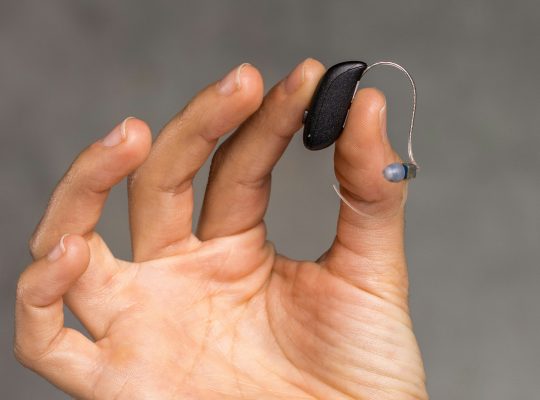When your hearing gradually deteriorates, you don’t always notice it right away. Unlike sudden hearing loss, it creeps into your life unnoticed. You adapt, without being consciously aware of it. What many people don’t know is that you can stop hearing certain sounds a long time ago – without even realizing it.
In this blog, we list ten sounds that are often the first to disappear with hearing loss, and that people surprisingly don’t miss … until they hear them again.
1. Bird sounds
Whistling blackbirds, twittering sparrows or the sharp “chirp” of a blue tit: high-pitched bird sounds are often the first to disappear with hearing loss. Because these tones are in the high frequencies (between 3,000 and 8,000 Hz), they are often no longer audible to people with age-related hearing loss (presbyacusis).
Many people don’t realize until after wearing a hearing aid that mornings suddenly sound a lot livelier.
2. Rustling leaves
A walk in the woods suddenly sounds a lot quieter when you no longer hear the wind blowing through the leaves. The gentle rustling is a typical example of a subtle sound that disappears unnoticed – and therefore often not missed.
Until someone after years with hearing aids says again, “What a sound the forest actually makes!”
3. The direction of sound
Not so much a sound itself, but the ability to hear where sound is coming from often goes unnoticed. That’s because hearing loss is usually different on both ears. This makes it harder to judge where a voice is coming from, or from which direction a car is approaching.
It can lead to uncertain situations in traffic or awkward reactions during a conversation – without realizing exactly what is going wrong.
4. Buzzing devices
The refrigerator turning on, a charger humming softly or your laptop’s fan – many of these kinds of sounds fall within the higher frequencies. People with hearing loss don’t notice they are missing it until someone else says, “Do you hear that sound, too?”
Not infrequently, such a device has long since turned out to make an irritating noise … that you yourself simply do not perceive (anymore).
5. Whisper
Whispers are not only softer, but also contain fewer high-volume sounds (such as vowels). Most whispers are at the high end of the frequency spectrum, which means they often disappear first with hearing loss.
And so you miss not only the whispers themselves, but sometimes important details in a conversation – especially in crowded environments.
6. Children’s Voices
The voices of young children are higher in tone than those of adults. With mild to moderate hearing problems, these voices quickly fall out of your hearing range. The result: you miss what your (grand)child is saying, without knowing exactly why. Or you hear it, but can’t quite place it.
For many people, missing the voice of a child or grandchild is ultimately the reason to have a hearing test done after all.
7. One’s own footsteps
A surprising but common experience when wearing hearing aids is hearing your own footsteps again. The tapping of heels on a floor, the crunch of gravel or leaves under your shoes: it’s something many people unconsciously miss with hearing loss.
Sometimes that sound is even perceived as “disturbing” at first – precisely because it has been absent for so long.
8. The raindrops on the window
A soft tapping sound on the skylight, or the rhythmic clanging of an umbrella: the sound of rain is soothing and often associated with coziness. But for those with high-frequency hearing loss, these sounds go unnoticed.
Until you hear them again – and suddenly realize how “empty” silences can be without that background noise.
9. The ticking of the clock
Ticking clocks, the mechanism of a watch or a cooking timer are all examples of subtle sounds with limited loudness. They are often not noticed even when they fade away.
Yet these kinds of rhythmic sounds subconsciously give many people a sense of orientation or calm. Consequently, hearing them again is often experienced as pleasant.
10. Consonants in conversations
One of the most common complaints with hearing loss is, “I can hear you talking, but I can’t understand you.” This is because consonants such as s, t, f, k and h often have less volume than vowels, AND are in the higher frequencies.
So you miss them, without knowing you are missing them. The result: words sound “flat” or unclear, and your brain has to work harder to make sense of them.
Why this is important to know
Missing sounds without realizing it makes hearing loss insidious. Your brain compensates, reading more from someone’s lips, or avoiding situations that require a lot of listening. As a result, it often takes years for someone to seek help.
But the earlier you recognize hearing loss, the better the outcome of any support you may need. Hearing aids or hearing protection are so sophisticated today that they support your hearing almost imperceptibly – without sacrificing comfort or style.
What can you do?
Are you wondering if you miss certain sounds? If so, there are a few simple steps you can take:
- Take a hearing test. You can do that with us, of course. Fast, painless and free.
- Pay attention to subtle signals. Do you often ask “What are you saying?” or turn up the TV louder than your roommates? Then it’s good to be alert.
- Talk about it. Hearing loss is nothing to be ashamed of. By discussing it, you avoid misunderstanding or isolation.
- Protect your hearing. Even if you have no symptoms yet. Hearing protection at concerts, festivals or at work can help prevent hearing loss.
In conclusion
Hearing loss is rarely black and white. It creeps in, you adjust – and you don’t notice what you’re missing until you get it back. Many people are surprised when they put in their hearing aids after years: “How much I suddenly hear!”
So: are you in doubt? Don’t wait. You may discover sounds you had long forgotten.
Want to know how to protect your hearing, or which aids are right for your situation? Then take a look in our webshop. From hearing protection to maintenance products, we can help you hear better – and hear more.








